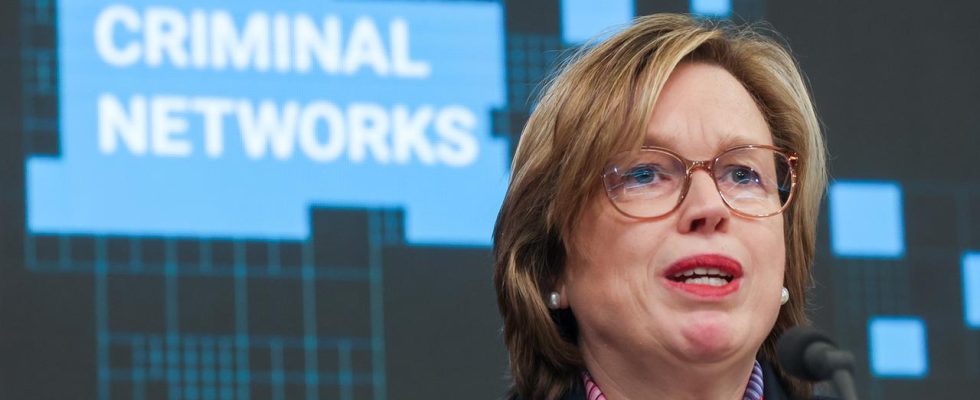They are mainly active in the drug trade, do not shy away from violence and operate across borders – for the first time Europol has details on more than 800 criminal networks. These also operate in Germany.
The Europol report aims to provide a better understanding of how criminal networks operate in the EU. Belgium’s Interior Minister Annelies Verlinden said that such an in-depth analysis of the most threatening gangs had never been carried out before.
“This unique dataset, created through the tireless collaboration of all EU member states and 17 of Europol’s partner third countries, represents a detailed profile of 821 of the most threatening criminal networks. For the first time we have detailed data on their activities, nationalities, working methods and their cross-border connections.”
According to the report, the 821 networks consist of around 25,000 members. Around half of them are involved in drug trafficking, mostly cocaine, synthetic drugs and cannabis, and around two thirds of the gangs use violence.
Networks mainly active in drug trafficking
The vast majority of these networks focus on criminal activity; only 18 percent are active in various fields. In addition to drug trafficking, the networks usually commit fraud. Other crimes include burglaries, thefts and human trafficking. A third of the networks also operate on a long-term basis and have been active for more than ten years.
All of these networks are active across national borders, explained Europol Managing Director Catherine de Bolle. “No member state is immune to this. There are 112 nationalities among the 25,000 suspects. Most groups are made up of several nationalities and only a third have members of a single nationality.”
The so-called “Mocro Mafia”, which is primarily active in the Netherlands and Belgium, is also structured on a multinational basis. Contrary to what the name suggests, according to the data, the network does not consist exclusively of members with Moroccan roots. Rather, they are multinational gangs that maintain contact with Spanish criminals and are primarily involved in the sale of cocaine and cannabis.
Activity beyond EU borders
In Germany, hundreds of ATM explosions are attributed to the “Mocro Mafia”. The Europol report also breaks down in which countries certain networks are active. Germany is one of the countries in which gangs are primarily active in drug trafficking, human trafficking or online fraud.
“Most groups have connections that go beyond the EU’s borders, especially in neighboring EU countries. A large majority, 76 percent of criminal networks, have a strong geographical focus. They do not expand their main areas of activity too far,” said de Bolle. At Europol these would be referred to as “glocal” criminal networks.
Often intertwined with legal industries
From the investigators’ point of view, the criminal networks are also dangerous because they are intertwined with legal sectors of the economy in order to conceal their criminal actions or launder their profits. From the investigators’ point of view, this makes the networks mobile.
One example mentions the leader of a criminal network from Marbella, Spain. He used several companies, including a company that imports bananas from Ecuador, as well as sports centers, shopping centers and restaurants, to conceal money laundering. 86 percent of the networks used legal business structures. The aim of Europol’s analysis is to use this data to combat organized crime in the European Union more specifically.
Paul Vorreiter, ARD Brussels, tagesschau, April 5th, 2024 2:40 p.m

